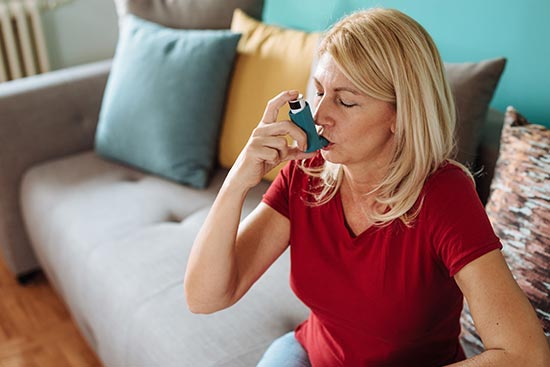Asthma
Adolescents & Adults
Asthma is a common lung disease that affects millions of people all over the world. Asthma is caused when the airways are narrowed (breathing tubes) in the lungs. The narrowing is reversible with treatment. The airways are sensitive to many different types of stimuli that can include viral illness (the common cold), allergens, exercise, medicines and environmental conditions.

Asthma Triggers
The factors that release asthma symptoms are called “triggers.” In order to prevent asthma flare-ups it’s important to identify these triggers. Common categories of asthma triggers:
- Allergens (including dust, pollen, and animal dander)
- Certain medicines known as beta blockers
- Emotional stress
- Irritants (such as tobacco smoke, chemicals and strong odors or perfumes)
- Menstrual cycle in some women
- Physical activity
- Respiratory infections
Intermittent Asthma
- Asthma does not interfere with daily activities
- Individuals with intermittent asthma have the following characteristics: Symptoms of asthma occur two or fever days per week
- Night-time symptoms awake you two or fewer nights per month
- Oral steroid treatment is needed no more than one per year to treat increased asthma symptoms
Persistent Asthma
Individuals who have symptoms regularly have persistent asthma. Occasionally your daily activities may be limited due to increased symptoms. Asthma severity is determined based on the following symptoms you exhibit and the amount of times per week you show the following:
- If you are pregnant or planning on becoming pregnant consult your health care professional for advice relating to your asthma.
- Night-time symptoms that awaken you from sleep
- Our doctors provide unique treatment plans for individuals suffering from asthma. Call our office today to schedule your appointment.
- Symptoms such as cough, wheeze and shortness of breath
- Symptoms that affect your ability to participate in normal activities
- Symptoms that need treatment with a bronchodilator (reliever medication)
Asthma in Children
Children 11 years and younger

Overview
A number if factors influence the optimal treatment of asthma including a child’s age, severity and frequency of asthma attacks, and proper use of prescribed medications. In most children, the treatment of asthma can lead to full participation in all strenuous activities without reoccurring asthma attacks.
Successful treatments for asthma include three components:
1. Controlling and avoiding asthma triggers
2. Regularly monitoring asthma symptoms and lung function
3. Understanding how and when to use medications to treat asthma
It is important to avoid triggers that worsen or set off asthma symptoms. Common asthma triggers include:
- Allergens (including dust, pollens and animal dander)
- Cold air
- Exercise
- Irritants (such as tobacco smoke, aerosol sprays and some cleaning products)
- Respiratory infections
Source: American Academy of Allergy Asthma & Immunology

